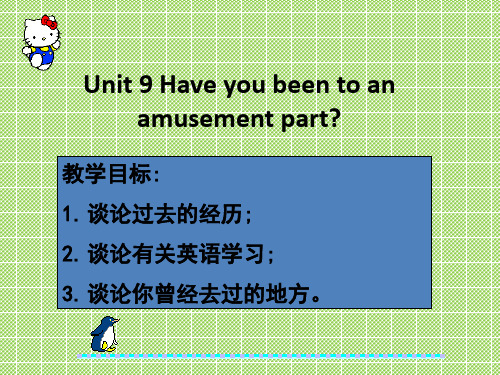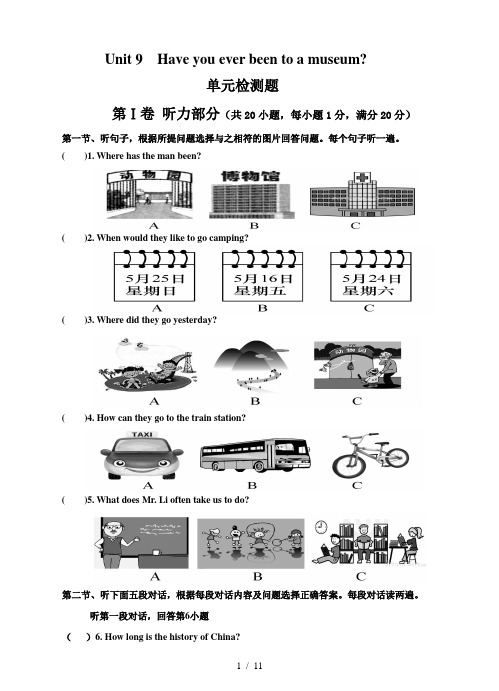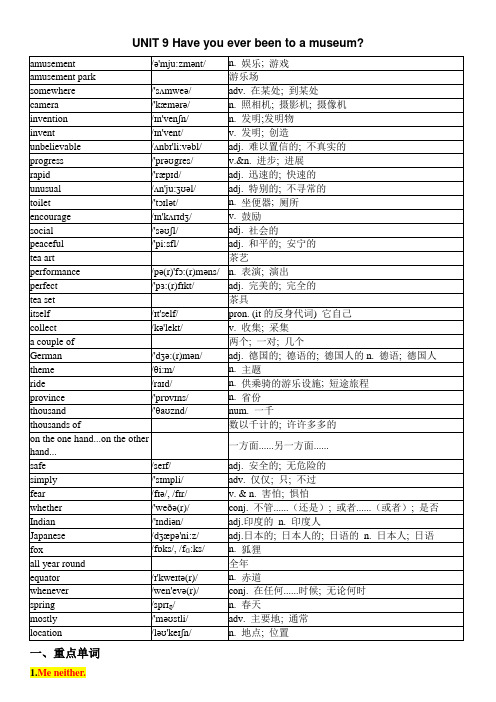(新版)人教新目标版2020学年八年级英语下册Unit9Haveyoueverbeentoamuseum导学案
Unit9《Haveyoueverbeentoanamusementpark_SectionA》课件1(39页)(人教新目标八年级下)

neither
(1) She isn’t a student. Neither am I (2) I can’t swim. Neither can he. (3) My husband doesn’t want to see a
movie tonight, and neither do I. (4) A: I haven’t seen that movie. Neither has he. (5)I didn’t go to school today. Neither did he ?
So 的用法
(1) She is a student, so am I (2) I can swim, so can he. (3) My husband wants to see a movie tonight, and so do I. (4) I have seen that movie, so has he. (5) I went to school today, so did he ?
2a Listen and circle the places you hear.
2b
Tina went to the space museum last year. John has never been to the space museum. They are going to take the subway. Linda has been to the aquarium. Linda went to the zoo three times last year. Linda is going to the zoo again next week. Harvey had a great time at Water World. Harvey’s friend has never been to W W. Harvey and his friend are going skating.
Unit9Haveyoueverbeentoamuseum_SectionA1a-2c课件人教版英语

Free talk Have you ever been to a/an_...? Yes, I have. /No, I haven’t.
have been to (去过),可 以与never[从没], ever [曾经], just[刚刚], once [一次], before[之前]连接。
ahsnmsciapsiawetutaruonscatrrecetmeymemrmzumeopusnuuoeastsuserepeumkuuammrmk
“我也是”结构: So+助动词/情态动词/be+主语(肯定) “So+助动词/be动词/情态动词+主语I.”=Me,too.
Drills --I have ever been to _a_s_c_i_en__ce__m__u_se_u_m___.
Have you ever been there?
回答1:Yes, __I_h_a_v_e___.
➢ 拓展:表示后者与前者情形相同,即“……也不……”时, 常用Me neither.或neither/nor引起的倒装句: Neither/Nor+助动词/系动词be/情态动词+主语.
时态上与前文保持一致,数要与其后的主语一致。
例:—I have never been to a water park.
Look at the map of the town. Listen and circle the places you hear.
2b Listen again and circle T for true or F for false.
Conversation 1
1. Tina went to the space museum last year. T/F
人教版新目标初中英语八年级下册Unit9-Have-you-ever-been-to-a-museum单元检测题及答案

Unit 9 Have you ever been to a museum?单元检测题第Ⅰ卷听力部分(共20小题,每小题1分,满分20分)第一节、听句子,根据所提问题选择与之相符的图片回答问题。
每个句子听一遍。
()1. Where has the man been?()2. When would they like to go camping?()3. Where did they go yesterday?()4. How can they go to the train station?()5. What does Mr. Li often take us to do?第二节、听下面五段对话,根据每段对话内容及问题选择正确答案。
每段对话读两遍。
听第一段对话,回答第6小题()6. How long is the history of China?A. Over 5,000 years.B. About 5,000 years.C. Less than 4,000 years.听第二段对话,回答第7小题()7. Where is Mr. Green?A. In the library.B. At home.C. In the office.听第三段对话,回答第8小题()8. When did Mr. Smith move to New York?A. In 2005.B. Six years ago.C. In 2000.听第四段对话,回答第9小题()9. Which mount did the man visit?A. Mount Hua.B. Mount Tai.C. Mount Heng.听第五段对话,回答第10小题()10. Whose backpack is it?A. Nancy’s.B. Sally’s.C. Cindy’s.听第六段对话,回答第11和12小题。
每段对话读两遍。
( )11. Where did Dad put the meat?A. On the tableB. On the chairC. In the fridge(冰箱)( )12. Why do they need some more meat?A. Because dad forgot to bring the meat home.B. Because mum ate it for lunch.C. Because grandfather and grandmother are coming.听第七段对话,回答第13至15小题。
2020春人教新目标英语八年级下册教学课件:UNIT 9 Have you ever been to

2c Look at the map in 2a and make conversations about the places.
A: Have you ever been to the space museum?
B: Yes, I have. How about you? A: No, I hav. Linda has been to the amusement park. T/F 2. Linda went to the amusement park yesterday. T/F 3. Linda is going to the amusement park again by bike. T/F
UNIT 9 Have you ever been to a museum?
Section A(1a—2d)
第1课时
学习目标
1 掌握生词及短语: amusement, somewhere, camera, invention, amusement park, have been to, go skating, learn about, put up;
人教新目标八年级下册unit9全单元知识点

Unit 9 Have you ever been to a museum 1.with beautiful tea sets用美丽的茶具沏一杯完备的茶2. a nice place to enjoy tea 一个品茶的好地方3.thousands of 数以千计的4.International Museum of Toilets国际厕所博物馆5.the Terracotta Army 兵马俑6.Southeast Asia东南亚7.Night Safari 夜间动物园8.three quarters 四分之三9.an English-speaking country一个讲英语的国家10.have problem doing sth. 做某事很困难11.during the daytime在白天12. a couple of times 好几次13.right now 如今;目前14.an amusement park with a special theme一个有特殊的主题的游乐园15.walk around the park 在公园里到处走16.hear of 听说17.take a ride兜风18.another province另一个省19.the Bird’s Nest鸟巢20.encourage sb. to do sth.激励某人做某事21.on the one hand... on the other hand.一方面,另一方面1. Have you ever been to...Have you ever been to a science museum你曾经去过科学博物馆吗?2. Let’s. 。
Let’s go somewhere different today.我们今日去个不同的地方吧。
3. It’s~\~adj. +that...It9 s unbelievable that technology has progressed in such a rapid way!科技以如此迅猛的方式开展真是令人难以置信啊!4. Whether... , you,11...Whether you like Indian food,Western food or Japanese food, you’ll find it all in Sin gapore!不管你喜爱印度食品、西方食品还是日本食品,在新加坡你都能找到!5. One great thing. . is that. .One great thing about Singapore is that the temperature is almost the same all year round.新加坡一个很大的特征是它的气温几乎一年到头都是一样的。
2020年人教版新目标 英语 八年级下册 Unit 9 Have you ever been to

UNIT 9 Have you ever been to a museum?一、重点单词1.Me neither.此句为省略句,用于口语中。
在这里相当于“Neither have I.或I haven’t either”。
--I don’t smoke. --Me neither.拓展英语中“也”的表达:(1)肯定句中的“也”①me too②so+助动词/be+主语③完整的肯定句后加“,too”He is a good student.他是一个好学生。
;Me tooSo am I. 我也是。
(2)否定句中的“也”①me neither②neither+助动词/be+主语③完整的否定句后加“, either”He didn't go to school.他没去上学。
Me neither.Neither did I. 我也没去。
2.Let's go somewhere different today.somewhere为复合不定副词,意为“某个地方”,通常用于肯定句,在否定句或疑问句中要用anywhere. 【注意】当形容词修怖不定代词something, anything, nothing, everything或者不定副词somewhere, anywhere, nowhere, everywhere等时,常放在所修饰的词之后。
I want to live somewhere quiet.Let’s go somewhere else.3.It’s really interesting, isn’t it?本句是一个反意疑问句,由“陈述句+附加疑问句”构成,用于要求对方证实所述之事。
反意疑问句前后两部分必须遵循的原则是“三同反”,即:人称相同,动词相同,时态相同,“前肯后否”或“前否后肯”。
附加疑问部分常译为是不是?不是吗?是吧?对吗?等。
They can go to the park by bus. can't they?We haven't been to the city, have we?反意疑问句要遵循的原则①如果陈述部分含有few, no, not, nothing, little, never, hardly, seldom等否定词时,附加问句部分要用肯定结构。
初中英语人教版八年级下册《Unit 9 Have you ever been to a museum
have gone 第一人称 to
She’s not here. She has gone to Qingdao.她不在这里,她去了青岛。
have been 在某地呆了多长时间,常接时间 He has been in London for half a
in/at
段
year.他在伦敦呆了半年。
presentation Grammar
5. A: Have you ever ___v_is_i_te_d__
(visit) the history museum?
B: No, I’ve never___b_e_en___ (be) there.
presentation
4b.Fill in the blanks with the correct forms of the verbs in brackets.
new words learn new words
3.theme/θiːm/ n. 主题 Then we have their new theme. 然后我们还有了新主题
4.ride /raɪd/ n. 供乘骑的游乐设施;短途旅程 What do you ride to go? 你乘坐什么去的?
5.province /'prɒvɪns/ n. 省份 which province are you from? 你来自哪个省?
presentation Grammar
2.have/has been to,have/has gone to与have/has been in的区分
have been 曾经去过,现已回来,可接次数 to
He has been to Beijing 3 times.他 去过北京三次。
人教新目标版英语八年级下Unit9Haveyoueverbeentoamuseumhavehasbe
Have/has been to与have/has gone to教学目标:学生通过观察不同情境中have/has been to与have/has gone to的使用,归纳总结现在完成时中have/has been to与have/has gone to的用法,并能在现在完成时中恰当使用。
教学重难点:掌握have/has been to与have/has gone to的区别,并能在现在完成时中恰当使用。
教学步骤:Step 1 Lead inPresent two different situations in which have/has been to and have/has gone to, to show the meanings and the differences between have/has been to and have/has gone to in The present perfect tense.Step 2 PresentationShow some sentences and have students summarize the difference between have/has been to and have/has gone to, and tell the students to recall the main usages of have/has been to and have/has gone to.have/has been to and have/has gone to它们都表示去某个地方,都是现在完成时态,表明动作已经发生,但是他们的含义是不同的。
have/has been to 表示某人曾去过某地(现在已经回来)。
如:He has been to American twice.他去过美国两次了I have ever been to the Great Wall.我曾经去过长城。
新目标人教版初中英语八年级下册Unit9Haveyoueverbeen
Unit 9 (8B) Have you ever been to anamusement park?I. Teaching aims1.Help the students master the words and expressions.2.Help the students learn to talk about the places they havebeen to.3.Realize the beautiful life and enjoy it.II. Key points and difficulties1.The patterns of “ have/has been to”.2.Talking about the places they have been to.III. Teaching methodsListening, oral and writing practice.IV. Studying methodsPairwork and groupwork.V. Teaching procedures:Step 1 Warm up and lead inA guessing game and a short video to present “have been to”.Step 2 PairworkLearn the new words with the help of pictures. Then present thenew dialogue and have the students practice the dialogue.Step 3 1b listen and find out what places they have been to.Step 4 Game(magic eyes)Show the photos of some places quickly, have the students tell the answers quickyly. It is to practice “He/She has been to…”Step 5 2a Listening. Listen and circle the places they hear.Step 6 2b ListeningStep 7 GroupworkWork in groups of four. Take turns to ask their partners. The others answer the questions as quickly as you can.Step 8 SummaryAsk the students to summarize what we learned. (words and expressions)Step 9 Surveyone of their friends and write the report.their passages in class.Step 10 HomeworkWrite about one of their own trips by using what they have learned.Enjoy traveling!Survey one of your friends and try to write your report.1.Do you like going out on vacation ?Very much A little Not at all2.How often do you go out to have fun?Usually Often Sometimes Never 3.Where have you been?_______________________________4.When did you go to …?_______________________________5.Where are you going next vacation?_______________________________6.How are you going there?Other ways ___________7. (other questions you want to know)…Report: My good friend … likes …. She/He…。
八年级英语下册Unit9Haveyoueverbeentoanamusement?基础知识必背手册(新版)人教新目标版
Unit 9 Have you ever been to an amusement?短语归纳1. have been to 到过某处(现在已回来);have gone to 到某处去了(现在还没有回来);have been in/at 在某处呆了多久。
have been here ; have gone there(副词前不用to)2. an amusement park 游乐园3. a water park 水上公园4. a roller coaster 过山车;5. see sb. doing sth. 看见某人正在做某事;see sb. do sth. 看见某人做了某事6. walk around 四处走动7. take a ride 兜风 8. on board 在船上9. take different routes 走不同的路线 10. end up with sth 以…结束; end up doing sth 以做某事结束11. argue with sb. 与某人争吵 12. an English-speaking country 说英语的国家13. an exchange student 交换生 14. a flight attendant 一名机组乘务员15. a tour guide 导游16. such as 例如; for example例如(后用逗号隔开)17. listening skills 听力技能 18. in Southeast Asia 在东南亚19. take a holiday 度假 20. three quarters 四分之三21. have problems (in) doing sth. /with sth 做某事很困难22. during the daytime 在白天期间; in the daytime 在白天 23. all year round 全年,一年到头24. wake up 醒来,唤醒,叫醒; Wake sb. up 叫醒某人 25.think about doing sth 思考做某事26.so much fun如此多的乐趣 27.welcome to 欢迎来到28.be welcomed by受到…欢迎29. think about 考虑30.think of 想起;认为 31. rather than 宁可;而不是32. neither…nor…既不……也不……(谓语动词使用就近原则)33. on the one hand,… on the other hand,….一方面……,另一方面……34.the best time to do sth 做某事的最佳时间35.the reason for … 的理由36.a zoo called/named...一个叫做……的动物园37.travel to... 到……去旅行38.it's fun to do sth 做……有趣 39.outside of China 在中国以外,在国外40.the way to do sth 做……的方法 41.a good place to... 一个……的好地方42.take lessons 上课43.it's because…that... 正是因为……才……44.close to... 离……近 45.far (away) from... 离……远46.try new food 尝试新食物 47.be asleep 睡着的48.be awake 醒着的用法集萃1. discover, find out , inventdiscover一般指发现以前不知道但存在的事物,强调其探索性。
- 1、下载文档前请自行甄别文档内容的完整性,平台不提供额外的编辑、内容补充、找答案等附加服务。
- 2、"仅部分预览"的文档,不可在线预览部分如存在完整性等问题,可反馈申请退款(可完整预览的文档不适用该条件!)。
- 3、如文档侵犯您的权益,请联系客服反馈,我们会尽快为您处理(人工客服工作时间:9:00-18:30)。
Unit 9 Have you ever been to a museum?第一课时Section A (1a-2d)学习目标1.掌握P65—P66的单词。
2.描述某人曾经去过哪些有趣的地方和谈论过去的经历。
重难点进一步掌握用现在完成时谈论过去的经历自主预习一.认真琢磨,细心选择(体会现在完成时和一般过去时的区别)。
()1.Where ______ you ______,John?I’m looking for you everywhere.A.have;beenB.have;been toC.have;goneD.did;go to()2.How long ______ your father ______ Shanghai?A.did;comeB.has;go toC.has;been toD.has; been in()3.I ______ my watch in my bedroom yesterday.A.leftB.forgotC.have forgottenD.have left二.写出下列动词的过去式和过去分词。
is _____ _______ write ________ __________ read _______ ________ study _______ ________ have _______ _________ eat ______ _______start______ _______ live______ _______ help ________ _________ travel_______ _______ say_______ ________ hear______ __________合作探究现在完成时(二)1.用法:(1)现在完成时表示过去发生的动作对现在造成的影响或结果。
常与下列时间状语连用:just , already, yet, ever, never, before, several times。
现在完成时不能和表示过去的时间(如:yesterday, last, year, in 1976, two days ago, just now, when she came in 等)连用。
(2)现在完成时表示过去发生的动作对现在的影响。
I have studied English. 表示我知道一点英语。
He has already come back. 表示他现在在这儿。
常与already, yet, just, recently, ever, never, before等表示不确定时间的时间状语连用。
2.现在完成时表示从过去一直持续到现在的动作或状态。
She has been ill for 3 days. He has worked in the bank since 1990.此时,句中谓语动词通常是延续性动词,且常与表示一段时间的时间状语连用。
如:these days, all this year, recently, for +时间段以及since+时间点等等。
2.构成:have / has +动词过去分词(1)has用于主语是第三人称单数,have用于其它人称。
(2)动词的过去分词构成分为规则动词和不规则动词。
规则动词在词尾加ed,其规则与过去式一样。
不规则动词的变化要记住。
例如:take-taken, go-gone等。
III.区分 have/has been to与have/has gone tohave /has been to 和 have/has gone to 都是指已经去了某个地方,但是 have /has been to 强调的是曾经去了某个地方并回来了; have/has gone to强调的是去了某个地方还没有回来。
--Have you ever been to Shanghai? --Yes, several times.-- Where is Mr. Wang??-- He has gone to Shanghai.达标测评一.单项选择。
( )1.Have you met Mr. Li ______?A. just B. ago C.before D.a moment ago( )2.—Our country ______ a lot so far . —Yes. I hope it will be even ______ .A.has changed ; well B.changed ; goodC. has changed ; better D. changed ; better( )3. _____ you ever _____ to an aquarium? Yes, we had a good time there.A. Have, goneB. Had, beenC. Have, been( ) 4. I _____ my grandpa last Sunday.A. have visitedB. visitedC. was visiting( ) 5. She _____ Shanghai for a month.A. has come toB. came toC. has been in( )6. Mr. Hu died last year. He ____for several months already.A. has been dyingB. has diedC. has been deadD. died( ) 7. Fanny _____ TV at this time last Saturday.A. has watchedB. was watchingC. watched( ) 8. Have you ____ been to our town before? No, it's the first time I ___ here.A. even, have comeB. ever, comeC. ever, have come( )9. May ______ the book for two weeks.A. borrowedB. lentC. keptD. bought( )10.Remember these new words ________him a lot of time.A. costsB. spendsC. takes二.用所给词的适当形式填空。
1.______(has)you ever ______(be)to the Great Wall?2.Where _______(have)he _______(go)?I can’t find him here.3.I________(go)to Fun Time Amusement Park last year.4.Harvey and his friend are going ________(skate)5.He. ________(work) in a small town two years ago.6. My brother ________(be)a soldier for two years.7.He ________(live)here for a long time.8. ________(do)he go fishing with you the day before yesterday.9. ______they______(finish)the work yet?10. When______ you ______(read)it?I______(read)it last year.总结反思我的收获:我的失误:课后作业完成《学练优》Unit 9 第一课时部分。
第二课时Section A (3a- 3c)学习目标1.学习P67的生词:2.能够掌握本课出现的重点短语和句子。
3.了解国外的风情和文化。
重难点一般过去时,现在完成进行时和现在完成时的区别。
自主预习一.英汉互译。
1.___________以如此迅猛的方式2.___________各种各样的3.___________ 马桶的发展4.___________社会团体5.___________茶艺表演6._____________________用漂亮的茶具沏一杯完美的茶7.___________ 一个品茶的好地方 8.___________ 相信9.____________________国际马桶博物馆 10.___________在未来二.小组成员互读单词和词组。
合作探究1. The most interesting museum I’ve been to is the American Computer Museum.多音节词和部分双音节形容词最高级加most构成,前面加the。
如: the most beautiful girl2. The old computers were much bigger.much可修饰形容词比较级,表示……得多。
如: much richera little, even, a bit也可以修饰形容词比较级。
3. I wonder how much more computer will be able to do in the future.不知道将来电脑还能够做些什么事情呢。
1)wonder 表示“ (对某事)感到疑惑; 想要知道; 想弄明白; 琢磨”, 后面常接由what, how, who 或者if/whether引导的宾语从句。
e.g. I wonder how they’re get ting on. 我想知道他们现在过得怎样。
I just wonder if they’ve arrived safely.我就想知道他们是否安全抵达了。
2)此句从句部分的原始结构是: How much more will computers be able to do in the future? 是对陈述句Computers will be able to do (much) more in the future.(电脑将来能够做更多的事情。
)的提问。
由于充当了宾语从句, 疑问结构改成了陈述结构: how much more computers will be able to do in the future, 即: 将助动词还原到陈述句的位置。
e.g. I don’t know when he will come.我不知道他什么时候来。
I don’t know where he lives.我不知道他住在哪里。
